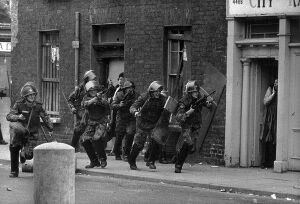1982 Vulkaria Coup D'etat: Difference between revisions
No edit summary |
No edit summary |
||
| Line 23: | Line 23: | ||
| status = | | status = | ||
| combatants_header = | | combatants_header = | ||
| combatant1 = * | | combatant1 = *[[Vulkaria|Government Forces]] | ||
| combatant2 = * | | combatant2 = *New Vulkarian People's Army | ||
* | *[[Malvarian Liberation Front]] | ||
Latest revision as of 19:37, 24 September 2020
| 1982 Vulkaria Coup D'etat | |||||||
|---|---|---|---|---|---|---|---|
 Vulkarian riot police charge protestors as a woman hides in her doorway on April 10th, 1982 | |||||||
| |||||||
| Belligerents | |||||||
|
|
| ||||||
| Commanders and leaders | |||||||
|
|
| ||||||
| Casualties and losses | |||||||
|
|
| ||||||
The 1982 Vulkaria Coup D'etat was the failed militaristic overthrow of the right-wing capitalist government of Vulkaria by the far-left marxist New Vulkarian People's Army under the command of Bernard Coard. On April 2nd, 1982, Coard's forces attacked the Ministry in the capital city of Vulkar, which led to intense street fighting. Several executions and massacres were taken by both sides of the conflict, but eventually, the politics of the time won over for Coard's forces, when they were given supplies by several capitalistic nations - most notably Zamastan. On April 31st, Prime Minister Yaan'a Tillman was killed by the NVPA, along with many members of his cabinet. In May, the new government was officially established when the NVPA took control of the capital, and Eugenia Charles was instated as the new Prime Minister. Resistance by the former-government forces and the new rebel-terror group, the Malvarian Liberation Front, continued to fight for control of the last urban centers. Fighting came to a stand still on June 23rd when NVPA forces took the last major city in Vulkaria, Amstelveen. However, sporadic fighting and isolated attacks from the M.L.F. would continue well into 1983, when the Zamastan-led coalition invasion into Vulkaria started the First War in Vulkaria to cease and assist in the ongoing civil war.
The consequences of the coup were far reaching. The coup marked the start of political turmoil that racked the country until well into the 2000's with the Second War in Vulkaria restating the strength of the M.L.F. and the opposition to the capitalist government. However, the election of Farhen Brooks in 2014, as well as the elections in 2018 between him and Jurgen Beyer marked significant reversals of the political tension as the former adopted bi-partisan principles and worked towards a more moderate form of government.
Legacy
Popular Culture
The events of the coup were seen in the blockbuster film Revolutionary Road, which followed two members of the Marxist side of the conflict as well as the Zamastanian government's responses to the crisis.
